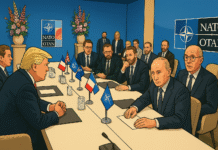
|
Getting your Trinity Audio player ready...
|
A high-stakes minerals agreement between Ukraine and the United States is hanging in the balance as both nations wrestle with last-minute terms. The deal—pitched as a key component of Ukraine’s post-war recovery—aims to tap into the country’s vast natural resources in exchange for American investment and support.
Ukrainian Deputy Prime Minister Yulia Svyrydenko traveled to Washington this week to finalize the agreement. But just as the finish line appeared near, new demands from the U.S. threw up fresh obstacles. Washington now insists on the signing of three binding documents, while Kyiv is pushing back, seeking adjustments that better protect its long-term interests.
This minerals pact isn’t just about economic recovery—it’s symbolic of how global power dynamics are shifting. With Ukraine relying heavily on U.S. aid amid its war with Russia, the deal is widely viewed as a kind of strategic reimbursement: critical resources in return for critical support.
Analysts say if the deal is sealed, it could provide Ukraine with the financial foundation to begin rebuilding, while securing the U.S. a reliable supply of essential minerals—possibly positioning it to reduce dependence on adversarial nations.
But if negotiations break down, it could signal deeper friction in U.S.-Ukraine relations at a pivotal moment in the conflict.
Resources are power. And in today’s geopolitics, who controls them often controls the future.

















Can you be more specific about the content of your article? After reading it, I still have some doubts. Hope you can help me.